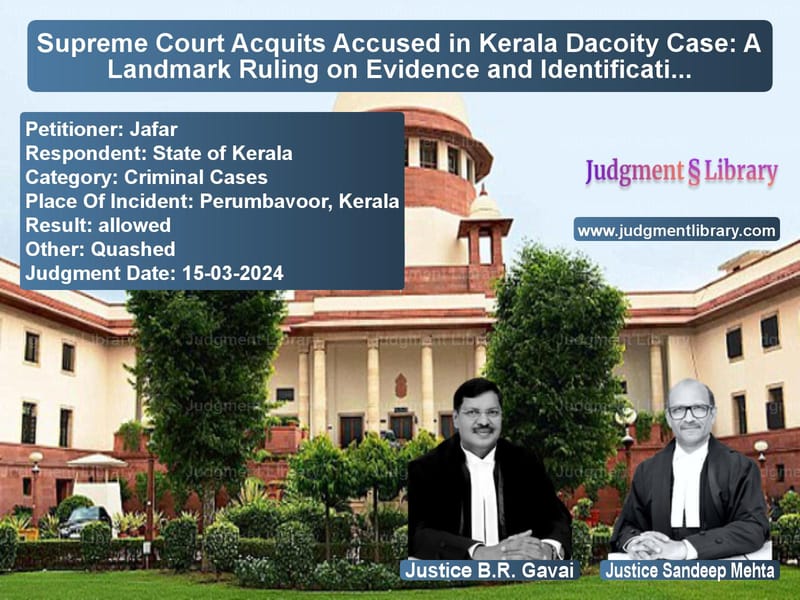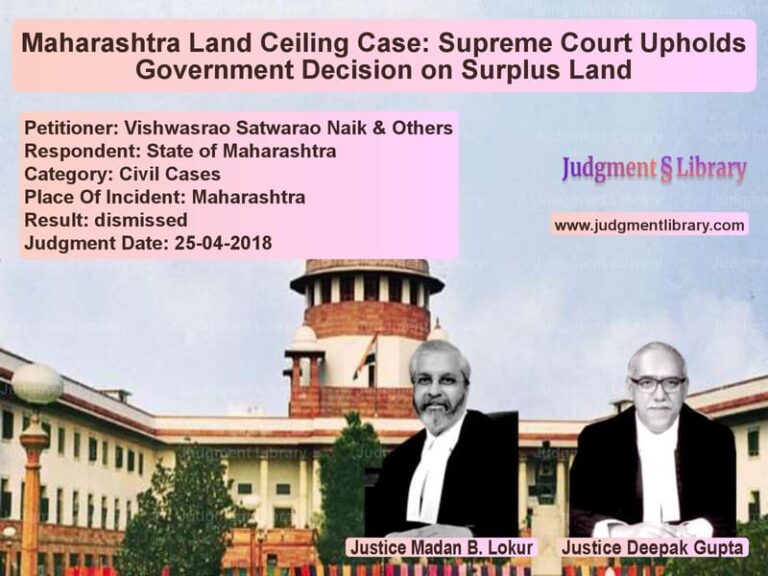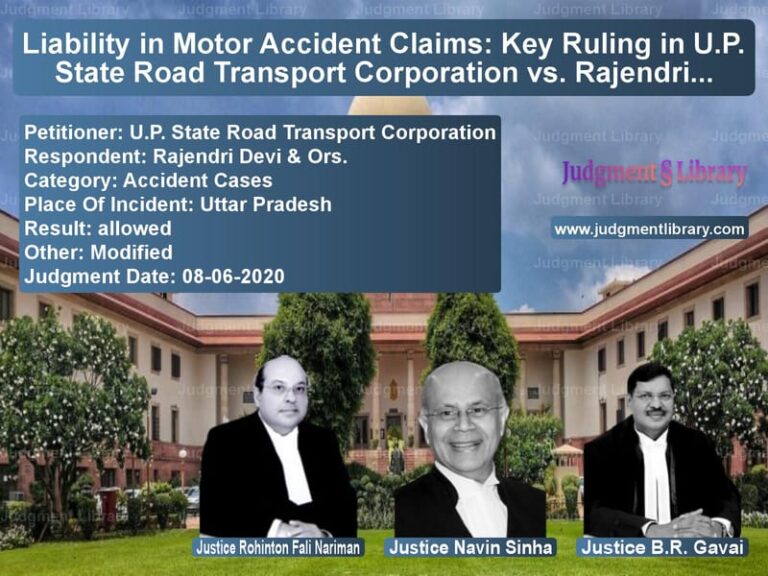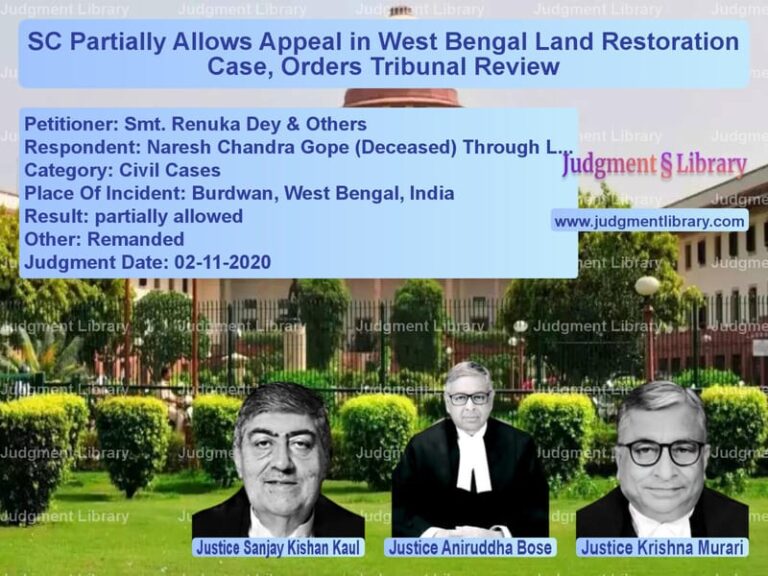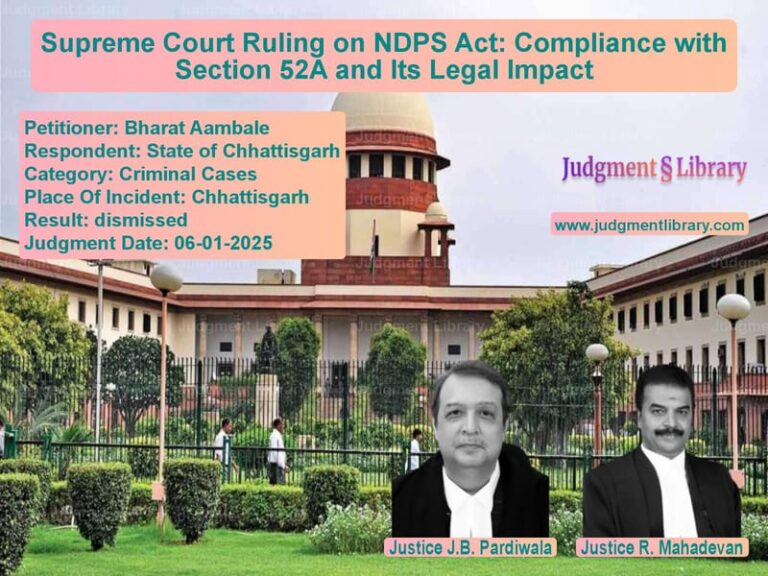Supreme Court Acquits Accused in Kerala Dacoity Case: A Landmark Ruling on Evidence and Identification
The Supreme Court of India, in a significant ruling, acquitted Jafar, the appellant, who was convicted under Sections 397 and 395 of the Indian Penal Code (IPC) for his alleged involvement in a dacoity case in Kerala. The Court ruled that the prosecution failed to provide concrete evidence, and the identification process was flawed, making the conviction unsustainable.
Background of the Case
The case dates back to May 14, 2004, when eight accused individuals were alleged to have committed dacoity at a building in Perumbavoor, Kerala, where the retail shops of the Kerala State Beverages Corporation were located. According to the prosecution, the accused arrived in a vehicle and forcefully entered the premises, assaulting the security guard (PW-1) and robbing him of his mobile phone, wristwatch, and torch.
The prosecution claimed that the accused used deadly weapons such as iron levers and wooden bars during the crime. Crime No. 345/2004 was registered at the Perumbavoor Police Station under Section 397 IPC, and the case was later committed to the Sessions Court in Ernakulam.
Trial Court Conviction
The trial court found accused Nos. 2 (Jafar) and 3 (Saneesh) guilty based on the deposition of PW-1, the security guard who identified them in court. The trial court sentenced Jafar to rigorous imprisonment for seven years, along with a fine of Rs. 10,000, and in default, three months of simple imprisonment.
Accused No. 5 was acquitted, and the trial against Accused Nos. 1 and 4 was conducted separately as they had absconded.
High Court’s Decision
Jafar appealed to the High Court of Kerala, but his conviction was upheld. The High Court ruled that both the trial court and the prosecution had correctly established his involvement in the crime. Dissatisfied with the ruling, Jafar approached the Supreme Court.
Arguments by the Appellant (Jafar)
Jafar’s counsel argued that:
- The conviction was based on unreliable evidence and lacked corroboration.
- The prosecution failed to conduct an identification parade, making the witness’s court identification inadmissible.
- The prosecution did not recover any stolen property from Jafar.
- The alleged recovery of an iron rod was not substantial evidence, as such an item can be found anywhere.
Arguments by the Respondent (State of Kerala)
The State of Kerala, opposing the appeal, contended:
- The trial court had correctly convicted Jafar based on the security guard’s testimony.
- The evidence presented was sufficient to establish his guilt beyond a reasonable doubt.
- Both the trial court and the High Court had concurrently upheld the conviction.
Supreme Court’s Observations
1. Flaws in Identification Process
The Supreme Court scrutinized the evidence and noted that the key testimony against Jafar came from PW-1, who identified him in court. However, the Court highlighted that PW-1 had previously seen Jafar at the police station, which compromised the reliability of his identification.
Read also: https://judgmentlibrary.com/supreme-court-quashes-criminal-proceedings-in-business-contract-dispute/
The Court observed:
“PW-1 clearly states that he identified the accused persons since the police had shown him those two people.”
The Court further emphasized that an identification parade should have been conducted to verify the credibility of the witness’s statement. Without it, the identification in court was highly questionable.
2. Lack of Corroborative Evidence
The Court also noted that the prosecution did not recover any stolen property from Jafar, weakening the case against him. It ruled that the recovery of an iron rod was insufficient evidence to establish his guilt.
3. Legal Principles on Identification
The Court referred to its previous rulings, which state that an identification parade is essential when the accused are unknown to the witnesses before the crime. It reiterated that identifying an accused for the first time in court without an earlier test identification parade cannot be relied upon.
Final Judgment
The Supreme Court overturned Jafar’s conviction, stating that the evidence against him was unreliable and insufficient to prove guilt beyond a reasonable doubt. The Court ruled:
“The judgment and order passed by the High Court dismissing the appeal and of the trial court convicting the appellant are not sustainable in law.”
The Supreme Court set aside the trial court and High Court rulings, acquitting Jafar of all charges. His bail bonds were discharged.
Implications of the Judgment
The ruling has significant implications for criminal law, particularly in cases involving identification and evidence collection:
- It reinforces the importance of test identification parades in criminal trials.
- It highlights that a conviction cannot be solely based on flawed identification.
- It underscores the necessity of corroborative evidence in serious criminal cases.
- The ruling serves as a safeguard against wrongful convictions based on weak evidence.
This judgment sets a precedent for future cases where identification and corroboration play a key role in securing convictions.
Petitioner Name: Jafar.Respondent Name: State of Kerala.Judgment By: Justice B.R. Gavai, Justice Sandeep Mehta.Place Of Incident: Perumbavoor, Kerala.Judgment Date: 15-03-2024.
Don’t miss out on the full details! Download the complete judgment in PDF format below and gain valuable insights instantly!
Download Judgment: jafar-vs-state-of-kerala-supreme-court-of-india-judgment-dated-15-03-2024.pdf
Directly Download Judgment: Directly download this Judgment
See all petitions in Bail and Anticipatory Bail
See all petitions in Fraud and Forgery
See all petitions in Theft and Robbery Cases
See all petitions in Attempt to Murder Cases
See all petitions in Judgment by B R Gavai
See all petitions in Judgment by Sandeep Mehta
See all petitions in allowed
See all petitions in Quashed
See all petitions in supreme court of India judgments March 2024
See all petitions in 2024 judgments
See all posts in Criminal Cases Category
See all allowed petitions in Criminal Cases Category
See all Dismissed petitions in Criminal Cases Category
See all partially allowed petitions in Criminal Cases Category

